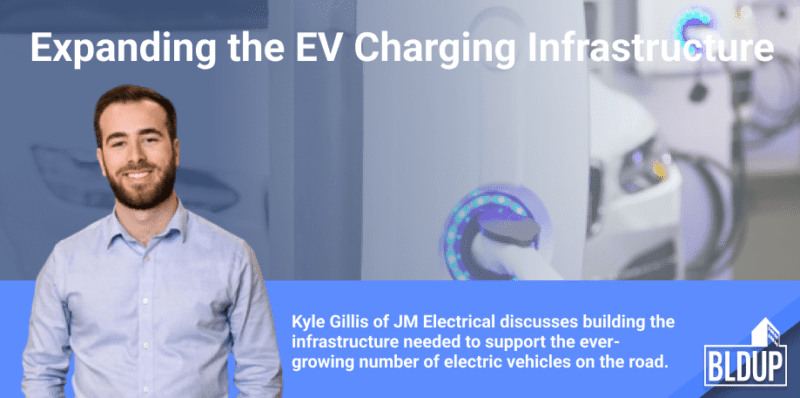BLDUP: Given recent changes to Boston’s building code, why is EV charging important for property owners/developers of new construction and existing properties?
Kyle Gillis: The lack of an EV charging infrastructure is by far the largest hurdle for consumers in the Greater Boston Area who own or are interested in purchasing an electric vehicle. The City of Boston demonstrated its commitment to bridging this gap between demand and the need for a robust EV charging infrastructure in September 2020 when civic leaders implemented their “Electric Vehicle Readiness Policy for New Developments. ”In accordance with the new policy owners and developers of projects which require Boston Transportation Department TAPA approval and/or Article 80 Large Project Review EV Chargers must be installed in 25% of total parking spaces proposed for the property, with the remaining 75% of parking spaces considered “EV-Ready.” This designation means that the remaining 75% of parking spaces must have electrical raceways installed so that they could easily be converted for use as future EV charging stations. Additionally, electric equipment rooms at these developments must have adequate space to accommodate future electrical infrastructure to power all future EV chargers.
BLDUP: What factors do owners/managers need to consider when adding EV charging to existing properties?
Kyle Gillis: When adding EV chargers to existing properties, owners and managers need to consider the current and future demand by tenants for EV charging stations. We have seen owners and property managers use quick online polls to determine how many of them currently own electric vehicles and to gauge their interest in the future purchase of electric vehicles. Another factor to consider when implementing EV chargers is the amount of existing electrical infrastructure available to serve new EV charging installations. Buildings with limited available electrical infrastructure may even require new or upgraded electrical utility services to accommodate EV charging, so it is important to understand at the outset how extensive an electrical upgrade EV charging could be for their properties.
BLDUP: Can you give us a quick overview of the timeframe/work involved with EV Charging install?
Kyle Gillis: EV charging installation timeframes and the work involved in these projects are subject to impact by current project conditions and the particular EV charging solutions that will be implemented. Generally, EV charging installations within existing indoor parking garages can have projects mobilized and installed within weeks if the building has been primed with the adequate electrical infrastructure necessary for the project. Some complex projects such as outdoor EV charging installations which may require trenching and concrete work or any projects requiring upgrades of the existing electrical service equipment. Timeframes for these more extensive projects could take months for rollout and installation.
BLDUP: What incentives could owners be eligible for when adding EV charging to their properties?
Kyle Gillis: When planning EV charging projects, owners and developers should research available grant and incentive programs that are specific to their projects. Many states and private utilities offer significant incentives for the purchase and installation of EV chargers. Both National Grid and Eversource offer funding support specifically for installation costs associated with EV charging projects for non-residential buildings. Additionally, for multi-unit dwellings, educational campuses, and businesses, the State of Massachusetts offers grant programs which cover 60% of the price of selected EV charging equipment.
BLDUP: Given the exorbitant rise in gas prices, electric cars now not only now make sense environmentally but financially. How has this affected the demand for EV charging?
Kyle Gillis: Electric vehicles have been gradually gaining popularity within the market due to an array of factors, among them the rise in gas prices. It’s easy for consumers to see the appeal of electric vehicles when the price to charge their cars is a fraction of the cost of filling up at the gas station. With the increased rollouts of electric vehicles from major brands such as Ford and Chevrolet, many different options for electric vehicles will soon be widely available to consumers. This demand may help drive down the purchase price of electric vehicles which historically has not included affordable options for consumers. While the demand for EV charging and electric vehicles is directly linked, it’s far easier to buy a car than it is to implement the infrastructure needed to support the ever-growing number of electric vehicles which are and will soon be on the road.
https://www.bldup.com/thought_leaders/expanding-the-ev-charging-infrastructure
